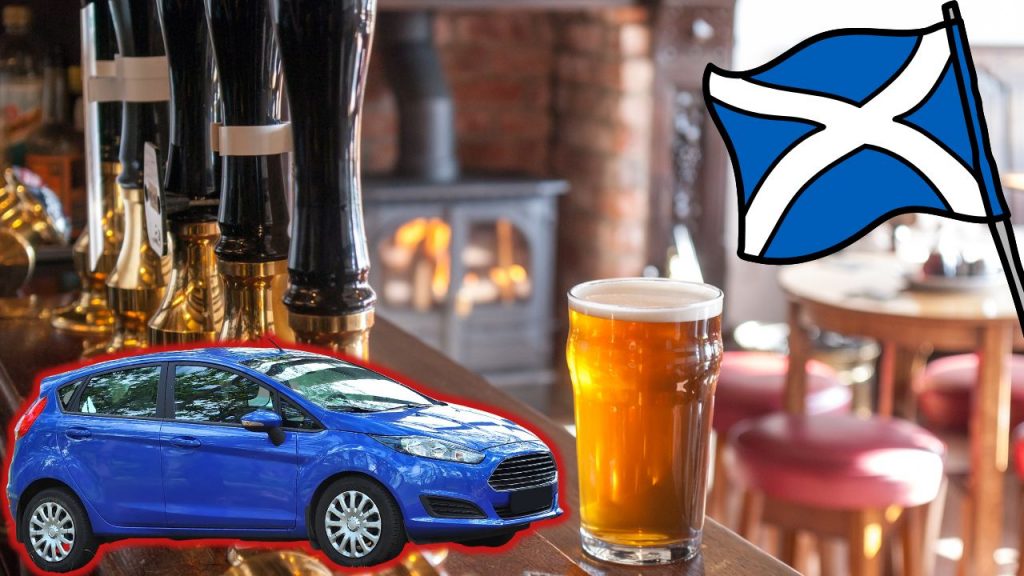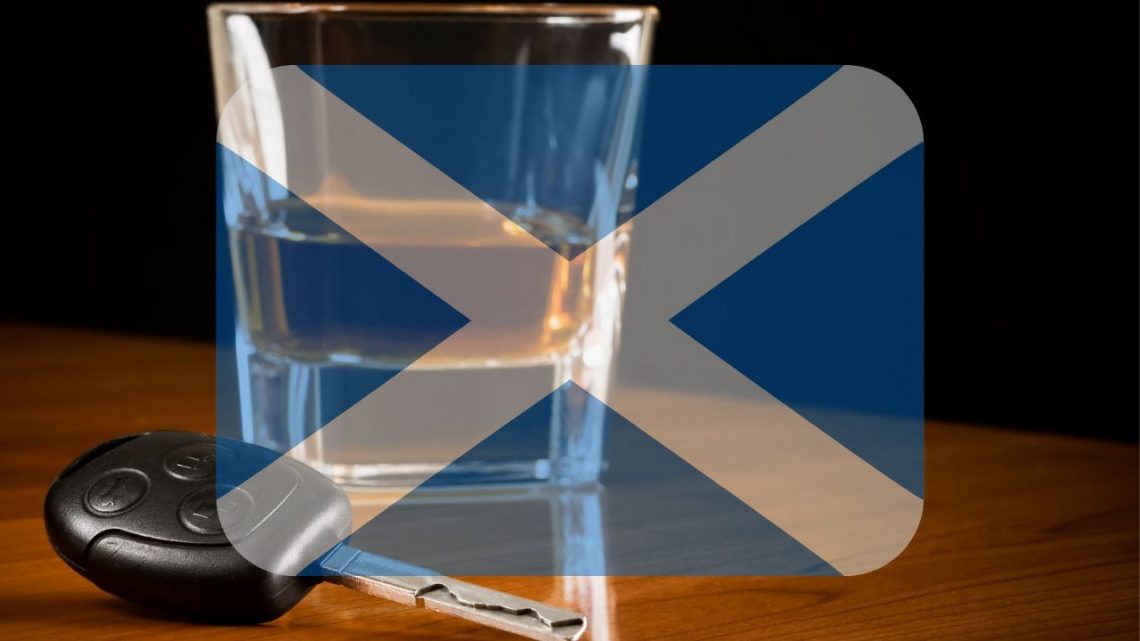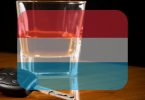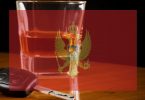In Scotland, the legal limit for a driver’s blood alcohol concentration (BAC) is set at 50 milligrams of alcohol per 100 milliliters of blood, equivalent to 0.05%.
This webpage aims to enlighten and inform individuals about the risks of driving while intoxicated in Scotland. The content of this site does not endorse or incite the act of operating a vehicle under the influence of alcohol in any region or nation.
What is the legal alcohol limit for driving in Scotland?
In Scotland, the laws governing the permissible levels of alcohol for drivers are clear and strictly enforced to ensure road safety. The current legal alcohol limits for driving are defined as follows:
- Breath: 22 microgrammes (mcg) of alcohol per 100 millilitres (ml) of breath.
- Blood: 50 milligrammes (mg) of alcohol per 100 millilitres (ml) of blood.
- Urine: 67 milligrammes (mg) of alcohol per 100 millilitres (ml) of urine.
These limits are designed to discourage drinking and driving, enhancing the safety of all road users.
Drink and Drive Penalties and Punishments in Scotland
In Scotland, the repercussions of drinking and driving are severe, reflecting the seriousness with which the law treats such offences. The penalties for being caught under the influence are not only substantial but also carry long-term implications that can affect one’s personal and professional life.
Alcohol Breath Test and Police Authority: The police have the authority to conduct a roadside breath test under the following circumstances:
- If you commit a traffic offence.
- If you are involved in an accident.
- If there is a suspicion that you may be impaired by alcohol.
Failing this preliminary test or refusing to take it grants the police the right to arrest you. Subsequently, you will be taken to the police station for two additional breath tests with a more sophisticated breathalyser. Failing these tests at the station or refusing to take them results in charges.
Consequences of a Drink Driving Conviction: Being convicted of drink driving is deemed a criminal offence, carrying severe penalties:
- A mandatory minimum driving ban of 12 months.
- The possibility of imprisonment for up to 6 months, a fine of up to £5,000, or both.
- The offence remains on your driving licence for 11 years.
- Potential forfeiture of your vehicle.
Given the gravity of these penalties, it is crucial to be aware of the law and its consequences. Laws and penalties can evolve, so it is advisable to frequently consult the official state website for the most current information regarding drink driving penalties and punishments in Scotland. This ensures that you remain informed about legal standards and the serious ramifications of drink driving.
How Can I Calculate if My Alcohol Blood Limit is Legal in Scotland?
In Scotland, the police use breathalyzers to measure the blood alcohol concentration (BAC) of drivers suspected of drinking and driving. This measurement determines whether a driver is within the legal alcohol limit for safe driving. If you’re curious about how to gauge your own BAC level to ensure you remain within legal limits, there are a couple of methods recommended by an expert with a decade of experience in phlebology.
1. Utilize a High-Quality Alcohol Breathalyzer: For those seeking a reliable way to measure their BAC, the use of a high-quality alcohol breathalyzer is advisable. Based on my extensive experience, the BACtrack S80 stands out as one of the most accurate options available in Scotland. It’s recognized for its professional-grade accuracy and has endorsements from DOT & NHTSA, in addition to being FDA 510(k) cleared. Keeping a device like the BACtrack S80 in your vehicle is highly recommended. It’s a common observation that people in Scotland may not always accurately judge their BAC levels, potentially leading to impaired driving without realizing it.
2. Use an Expert-Developed BAC Calculator: In collaboration with other phlebologists and web developers, I’ve developed a BAC calculator that’s been made available online. This tool is designed to help you estimate your BAC level based on the alcohol you’ve consumed. While it provides a useful approximation, it’s important to remember that like any BAC measuring tool outside of professional medical or law enforcement equipment, it cannot guarantee 100% accuracy.
Important Consideration: Both of these methods are designed to offer a guideline rather than an exact measurement. They are helpful in giving you a general idea of your BAC level and can be instrumental in preventing drunk driving by alerting you when you might be nearing or exceeding the legal limit of 0.05%. However, it’s crucial to understand that the safest and most responsible approach is to avoid driving if you’ve consumed alcohol or if there’s any doubt about your sobriety.
By using these tools, you’re taking a proactive step towards responsible driving and contributing to the safety of all road users in Scotland. Remember, the goal is to ensure you never find yourself inadvertently over the legal limit, thus avoiding the severe consequences associated with drink driving.
Ways to Avoid Driving with a High BAC in Scotland

Driving with a high blood alcohol concentration (BAC) not only poses serious risks to your safety and that of others but also carries severe legal consequences in Scotland. Fortunately, there are practical and convenient options available to ensure you can enjoy your social engagements without the worry of driving under the influence. Here are some recommendations:
1. Utilize Taxi Services or Ride-Sharing Apps: One of the simplest ways to avoid driving after consuming alcohol is to use taxi services or ride-sharing apps. In Scotland, there’s a variety of options available to suit your needs. For instance, in Edinburgh, you can book a ride with local taxi companies like Beep Beep Taxi, which is known for its reliable service. In Glasgow, Raz Private Hire & Airport Transfers offers an excellent solution for your transportation needs, ensuring you get home safely without having to drive yourself.
Ride-sharing apps such as Uber are also widely available in many Scottish cities, providing an easy and convenient way to book a ride directly from your smartphone. These services are typically quick, efficient, and can be less expensive than traditional taxis, making them an attractive option for getting home safely.
2. Opt for a Designated Driver Service: If you’ve driven to a location but decide not to drive back due to alcohol consumption, a designated driver service is a perfect solution. This service involves hiring a professional driver to take you and your vehicle back home. In Edinburgh, Transvercia Chauffeur Drive offers such services, ensuring you and your car get back safely. Similarly, in Glasgow, Blacklane provides a high-quality designated driver service to meet your needs.
To find a designated driver service in your city, a simple Google search for “designated driver service” along with the name of your city will provide you with various options. This way, you don’t have to worry about leaving your car behind or the hassle of retrieving it the next day.
Making Responsible Choices: By choosing either a taxi, a ride-sharing app, or a designated driver service, you’re making a responsible decision that ensures your safety and that of others on the road. These options not only help you avoid the risks associated with high BAC driving but also the potential legal ramifications. Remember, planning how to get home safely before going out can make all the difference in ensuring a worry-free and enjoyable evening.
Sticking to Drink and Drive Laws in Scotland: Sad Statistics
Transport Scotland reports a significant reduction in drink-driving related accidents and casualties from 2009 to 2019, with accidents decreasing by 62% and injuries and fatalities by 65%. This underscores the critical importance of avoiding driving after consuming alcohol, highlighting the risk it poses not only to the driver but also to other road users. Safe transportation options, such as designated driver services or taxis, are recommended to mitigate these risks.
Understanding and adhering to the drunk driving laws of the country you are in is crucial, alongside monitoring your blood alcohol level with an alcohol breathalyzer to ensure driving fitness. This proactive approach can prevent potential dangers and ensure compliance with legal limits.
For the latest information on Scotland’s drunk driving regulations and to ensure road safety, visiting the official Scottish government website is advised. Utilizing a certified alcohol breathalyzer can help monitor your blood alcohol level, offering a practical measure to avoid driving impaired and safeguarding well-being on the road.







